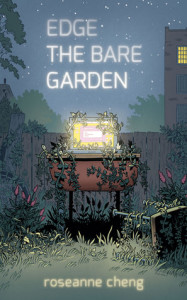★★★★½
Edge the Bare Garden by Roseanne Cheng is a wonderful instructional novel for teens.
Agnes hasn’t had an easy life. Even though she’s young, her daily life has been filled with taunts by her peers, reinforcing the belief that she doesn’t belong.
An opportunity arises for Agnes to seek revenge online. Can her actions be justified? Forgiven? More to the point, in today’s online world, who should be held responsible when individuals can hide their identity?
Roseanne Cheng is a teacher and founder of the website, Teachable Lit, which is dedicated to books and reviews that instruct young minds. Edge the Bare Garden is her second novel and the goal is to provide a story that does more than entertain. She wants her young readers to learn from the words on the page.
Convincing young people that learning is fun isn’t an easy task. However, if one can mask the lessons in a well-crafted story that includes hidden messages within the prose, it seems less like a lesson. This is what makes Edge the Bare Garden such a wonderful educational tool, because it doesn’t come across as homework.
Agnes is the type of character that most readers have encountered in life. Some may relate to her more than others. She doesn’t fit in. Most of the time she acts like she doesn’t want to. However, it’s clear that the rejection she encounters affects her. Most human beings want to fit in on some level.
When Agnes seeks revenge on her classmates, it serves up a sticky dilemma for the reader. On one hand, it’s hard to fault the girl. She’s been ridiculed for years. On the other hand, do two wrongs make things right? The scenario presented in the novel offers a fantastic way to get teens to have a heart-to-heart in the classroom, and share their thoughts about what they would do in her place.
It’s also important to note that this novel addresses a serious issue in society that is accelerating: online bullying. Bullying has always existed on some level for eons. However, in today’s world, bullying has been taken to a terrifying new level for teens, parents, teachers, and school officials. The Internet allows users to unleash hateful, intimidating, and threatening messages for all to see, and more often than not the accuser can remain anonymous. To compound the problem, once it starts, others can pile on the abuse, even those who have never met the victim.
The narrator of the story remains in that situation for the most part. In fact, it’s unclear who the narrator is, including their gender. This distance allows the narrator to relate the facts without guiding the reader. It’s a powerful way to instruct young minds. who more than likely don’t want to be told what to think. Coming to their own conclusions can have a lasting impact.
This is a thought-provoking novel that opens the door to honest dialogue. Cheng has also provided a study guide in the back of the book that provides open-ended questions for classroom discussions.
Links
Author Site
Facebook
Twitter
Amazon
Goodreads
Review Overview
Design
Content
Editing
Get an Editorial Review | Get Amazon Sales & Reviews | Get Edited | Get Beta Readers | Enter the SPR Book Awards | Other Marketing Services
























Leave A Comment